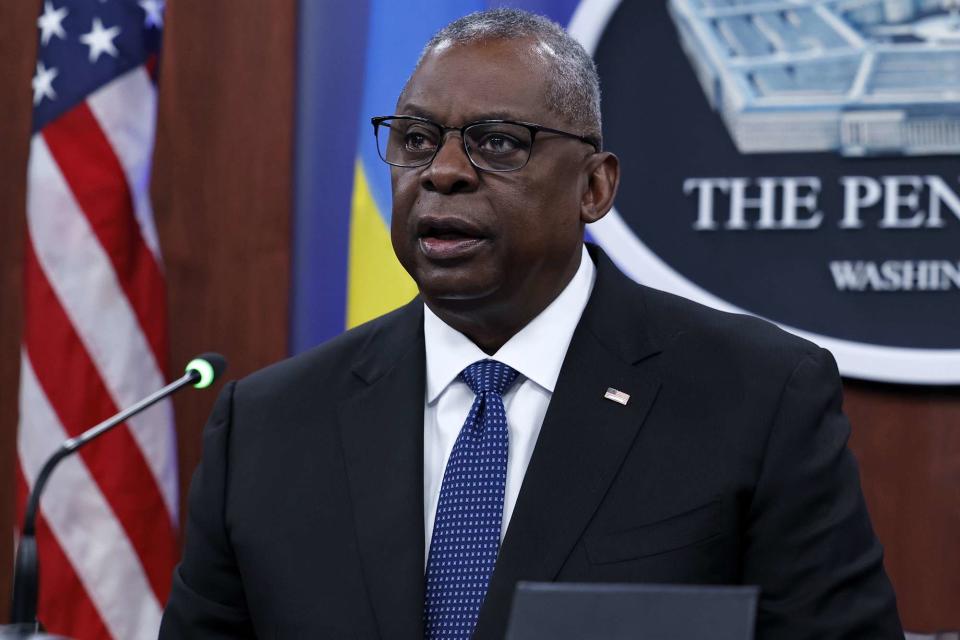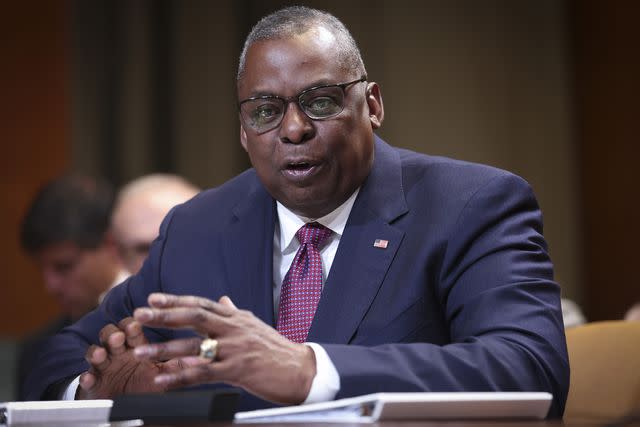Defense Secretary Lloyd Austin Was Treated for Early Prostate Cancer in December, Says Pentagon
- Oops!Something went wrong.Please try again later.
Austin went in for surgery to cure prostate cancer on Dec. 22, the Pentagon shared on Tuesday

Anna Moneymaker/Getty
U.S. Secretary of Defense Lloyd AustinDefense Secretary Lloyd Austin is recovering from complications after surgery for early prostate cancer, the Pentagon has confirmed.
Austin, 70, was admitted into Walter Reed National Military Medical Center on Dec. 22 for a “minimally invasive surgical procedure” after being diagnosed with prostate cancer earlier in the month, the Pentagon shared in a statement on Tuesday.
“As part of Secretary Austin's routinely recommended health screening, he has undergone regular prostate specific antigen (PSA) surveillance. Changes in his laboratory evaluation in early December 2023 identified prostate cancer which required treatment,” the Pentagon said.
“He was under general anesthesia during this procedure. Secretary Austin recovered uneventfully from his surgery and returned home the next morning. His prostate cancer was detected early, and his prognosis is excellent.”

Win McNamee/Getty
Austin went in for surgery for early prostate cancer on Dec. 22Austin, however, returned to the center on Jan. 1 after experiencing “nausea with severe abdominal, hip, and leg pain” due to a urinary tract infection, according to the statement. On Jan. 2, he was transferred to the intensive care unit “for close monitoring and a higher level of care.”
“Further evaluation revealed abdominal fluid collections impairing the function of his small intestines. This resulted in the backup of his intestinal contents which was treated by placing a tube through his nose to drain his stomach,” the statement explained. “The abdominal fluid collections were drained by non-surgical drain placement.”
The Pentagon added that Austin “has progressed steadily throughout his stay.”
“His infection has cleared. He continues to make progress and we anticipate a full recovery although this can be a slow process. During this stay, Secretary Austin never lost consciousness and never underwent general anesthesia,” the statement concluded.

Tasos Katopodis/Getty
Austin, 70, is recovering in hospital from complications after the surgeryRelated: Joe Biden Picks First-Ever Black Nominee for Defense Secretary
Austin’s hospitalization and health issues were communicated to the White House for the first time on Tuesday morning, National Security Council spokesman John Kirby said in a briefing on Tuesday.
"Nobody at the White House knew that Secretary Austin had prostate cancer until this morning and the president was informed immediately after we were," Kirby said.
“It is not optimal ... for a situation like this to go as long as it did, without the commander in chief knowing about it, or the national security adviser knowing about, or frankly, other leaders at the Department of Defense. That's not the way this is supposed to happen," Kirby continued, per ABC News.
He said that the Department of Defense is "is also looking at their own procedures to make sure that that doesn't happen again."
Never miss a story — sign up for PEOPLE's free daily newsletter to stay up-to-date on the best of what PEOPLE has to offer, from celebrity news to compelling human interest stories.
During the briefing, Major General Pat Ryder added that he understood that the issue is “deeply personal.”
The defense secretary is currently still in hospital, Ryder said, per ABC News, and he is "in contact with his senior staff and has full access to required secure communications capabilities and continues to monitor dod day-to-day operations.”
"He continues to stay very actively engaged with his senior staff and is making important decisions about national security and defense,” Ryder added.
For more People news, make sure to sign up for our newsletter!
Read the original article on People.

